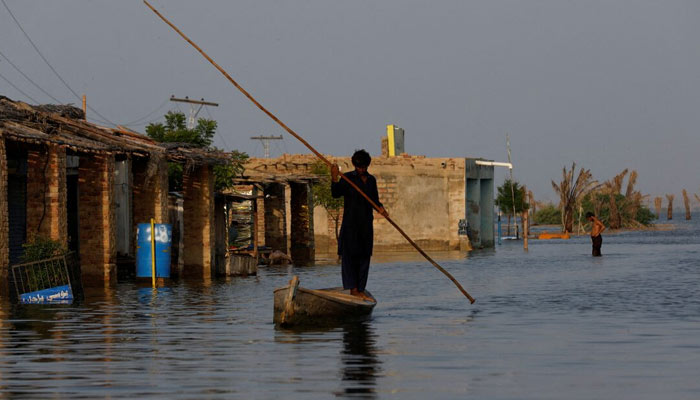Pakistan's lifeline for survival
Global community needs to step up for climate action; rich countries, biggest polluters, owe us a climate debt
December 16, 2024

The Climate Finance Action Fund from COP29 is a good start, but we need action, not just empty promises. The global community also needs to step up. Rich countries, the biggest polluters, owe us a climate debt.
Pakistan is staring climate change dead in the face, and it’s not blinking. From epic floods to bone-dry droughts, we’re living through a climate nightmare that’s costing us big time. The floods of 2022 alone turned a third of the country into a waterpark nobody asked for, displacing millions and causing $30 billion in damage. And yet, we contribute less than one per cent to global emissions. Talk about an unfair deal.
What we desperately need is climate financing — a fancy way of saying ‘Let’s invest in fixing this mess before it gets worse’. It’s not just about patching things up after disasters but about building a future where we’re better prepared. Spoiler alert: we’re lagging behind.
Think of climate financing as the ultimate survival kit. It is funding meant to help countries like ours adapt to climate change and reduce the risks it brings. We’re talking about everything from renewable energy projects to smarter farming techniques, resilient buildings, and better disaster management.
For Pakistan, it’s not optional. It’s a lifeline. Climate disasters already cost us $3.8 billion annually, and the numbers are climbing. Investing in climate resilience could save us so much more in the long run. Every dollar spent on preparedness can save up to $7 in recovery costs. That’s not just good math; it’s common sense.
Despite the need, Pakistan’s climate financing efforts feel like trying to put out a wildfire with a garden hose. Sure, we’ve got policies like the National Climate Change Policy, but they’re woefully underfunded.
International aid? Don’t even get me started. Getting money from global institutions often comes as loans instead of grants. That’s like getting a credit card to fix your roof while your house is on fire.
The $10 billion pledged at the Geneva conference post-flood sounds promising, but a lot of it is still stuck in red tape or comes with strings attached. Pledges are great for headlines, but what we need is cold, hard cash in the bank.
Pakistan’s approach to climate financing is a lot like patching a sinking ship instead of building a sturdier one. Most of the money goes into disaster recovery instead of prevention. It’s like buying a first aid kit after breaking your leg, instead of wearing a helmet in the first place.
Take agriculture, for example. It’s the backbone of our economy, employing more than 40 per cent of our workforce. Yet, erratic weather and water shortages are wreaking havoc on crops. Investing in smart farming methods like drought-resistant seeds or drip irrigation could work wonders, but these projects rarely see the light of day.
And then there’s renewable energy. Pakistan is a goldmine for solar and wind power, yet we’re still addicted to expensive, outdated fossil fuels. Why? Because funding for renewables is as scarce as rain in a desert.
We can’t keep putting out fires (literally and metaphorically). Here’s what we need to do: one, make it easier to get international funds. Simplify the process, boost transparency, and train local teams to meet international funding requirements. Bureaucracy is killing our chances.
Two, focus on adaptation. Instead of just cleaning up after disasters, let’s build resilient cities, manage water better, and plan smarter. Adaptation is the name of the game. Three, get businesses involved. The government can’t do it all. By offering incentives, we can get private companies to invest in green solutions. Think of it as a win-win: they profit, we survive.
Four, explore creative financing. Ever heard of green bonds or carbon trading? These innovative financing options could be game-changers for us.
Five, team up with neighbours. Climate change doesn’t care about borders. Sharing resources and knowledge with neighbouring countries could give us a much-needed boost.
Here’s the elephant in the room: none of this will work without serious political will. Climate change needs to be at the top of the national agenda, not shoved into the ‘maybe later’ pile. Politicians need to stop chasing short-term wins and start thinking long-term.
Bottom line: climate financing isn’t charity – it’s an investment in survival. For Pakistan, it’s not just about bouncing back from disasters but about building a future where we thrive despite the odds.
We’ve got the brains, the resources, and the resilience to make this happen. The question is: do we have the courage to rise to the challenge? Because one thing’s for sure: the cost of doing nothing is a bill we can’t afford to pay.
The writer is head of the Trade, Industry & Productivity (TIP) research group at the Pakistan Institute of Development Economics (PIDE), Islamabad.
Disclaimer: The viewpoints expressed in this piece are the writer's own and don't necessarily reflect Geo.tv's editorial policy.
Originally published in The News











